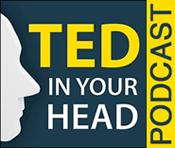Please Look Into My Eyes….
A number of years ago I did a self-development seminar called the Landmark Forum. It was a life changing experience for me but it’s not for everyone.
One of the exercises we did during the seminar was to stand across from another person and look into their eyes for five minutes without saying anything. When the exercise was announced, I heard someone sitting behind me say “What a stupid exercise. I look into people’s eyes all day long, I don’t need to pay to do it in a seminar.”
I’d never done this sort of exercise but I thought it might be interesting. Well, it was a lot more interesting than I thought.
I stood across from my parter in the exercise and looked into their eyes. Immediately, a conversation started in my head, and it went something like this:
“God, this is wierd, I don’t even know this person and now I’m staring into their eyes. This is a little embarrassing. I wonder what they think about me. Geez, I hope I don’t have any eye boogers. Should I smile? If I start to smile, but then I might start laughing. That wouldn’t be cool because they might think I was laughing at them. Now they’re smiling at me. What does that mean? How much time has passed? When do we break for lunch?”
Some people did start laughing, little nervous laughs. Then some people started crying, one of whom was the woman who thought the exercise was stupid.
The conversation in my head started to quiet down. I stopped thinking about me and started to think about them. What were they like? What did they do? I thought I saw some sadness in their eyes. What happened?
Then something very interesting happened. The conversation in my head stopped and I found myself with another human being. Not doing, not talking, just being with them. Without knowing any of the details of their life, I realized that I knew everything about them that I needed to know. I felt connected with them, and it felt comfortable, and, well, good. It was an incredibly powerful experience.
When the exercise was over, the woman who complained shared her experience with the group. She said “I wept because I realized I never look into anybody’s eyes. Even when I’m in front of someone, I’m never really with them.”
I’ve had the opportunity to do this exercise in workshops more than once and each time I’m blown away by the experience.
It makes me aware that many of us, myself included, have the tendency to go through the day in a way that is closed off and sealed tight. Eyes averted, face stiff and hard. “Let’s get this over with asap” we say with our body language. Sometimes at networking events, when I shake someone’s hand they’re not even looking at me.
We come into contact every day with so many people but often it’s no more personal or meaningful than getting a soda out of a vending machine. Sometimes I’m aware of talking with my children without even looking at them and the talking is automatic. “yes, oh, that’s nice, yeah, uh huh, ok…”
It takes courage to look in someone’s eyes because to do that you must reveal yourself. You let the other person in a little. You let them “see” you. This is can be threatening.
But when I remember to look into the eyes of another, then every contact is an opportunity for connection with another. You might think this would get exhausting, but the amazing thing is that it gives me energy, a feeling of lightness. I acknowledge them, and they, me.
When I stop what I’m doing and look into the eyes of my children, I become present to their innocence, their beauty and their incredible aliveness. And I get some of that for myself.
We’re all trying to feel better. Be happier. Trying to feel less isolated in the solitary but cramped spaces of our minds.
Try this just for today: look into the eyes of each person you come into contact with. See what comes up. Discomfort? Self consciousness? Maybe you’re already good at connecting with people in this manner. If so, then notice how many people have trouble meeting your gaze.
If we could learn to look into each other’s eyes with respect, acceptance and compassion, then we just might see the soul behind those windows. Then perhaps we would see each other for who we really are: vast, infinite, limitless and magnificent.
If you liked this post, please leave a comment and/or share it with your social networks.
Ted A. Moreno
Personal/Small Business Coach Certified Hypnotherapist www.TedMoreno.com (626) 826-0612


